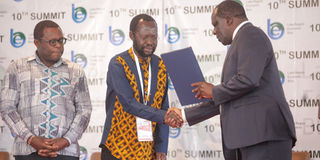Ruto-allied governors skip meeting of Lake Region Bloc

Former Lake Region Economic Bloc (LREB) Chairman Governor Wycliffe Oparanya hands over instruments of power to Kisumu Governor Anyang Nyong'o and Bungoma Governor Ken Lusaka after they were elected LREB Chairman and Deputy Chairman respectively at Ciala Resort in Kisumu County on November 21, 2022.
A move by President William Ruto-allied governors to skip the Lake Region Economic Bloc’s (LREB) 910th summit has brought to the fore the deep political divisions that derailed the operations of the outfit since its inception.
The summit is an annual high-level meeting of the bloc's leaders and development partners to discuss ways of energising and coordinating the economic vision of the 14 Lake Basin counties.
The counties are Kisumu, Siaya, Migori, Homa Bay, Nyamira, Kisii, Kakamega, Bungoma, Vihiga, Busia, Trans Nzoia, Bomet, Kericho and Nandi.
The county bosses who attended the event included the host Peter Anyang’ Nyongó (Kisumu), James Orengo (Siaya), Gladys Wanga (Homa Bay), Ochilo Ayacko (Migori), Simba Arati (Kisii) and Amos Nyaribo (Nyamira).
Also present were Fernandes Baraza (Kakamega), Kenneth Lusaka (Bungoma), Paul Otuoma (Busia), George Natembeya (Trans Nzoia) and Wilber Ottichilo (Vihiga).
The two-day event, which ended on Monday, was skipped by governors Stephen Sang (Nandi), Hillary Barchok (Bomet) and Erick Mutai (Kericho).
But Nandi Deputy Governor Yulita Cheruiyot attended the summit and Prof Nyong’o told delegates that Mr Sang was out of the country.
The summit came at a time of transition for the administrations of member counties following the August elections.
While the governors chose not to speak about the issue directly, many delegates raised questions on whether Rift Valley counties were committed to the bloc.
But when he rose to speak, the former chairman of the bloc, Wycliffe Oparanya, cited lack of enough funding, political undertones in counties and bureaucracy in the outfit as major challenges.
“We have established ourselves as non-political institutions but sometimes it is difficult to keep politics from institutions led by politicians. This is something the incoming governors and summit has to address so that it does not derail our dream,” Mr Oparanya said.
He added: “When we are here, we are not supposed to talk of Azimio or Kenya Kwanza, because we are here purely on economic issues.
“The political overtones will never miss but you have to address it so that our primary objective of improving the welfare of our people on the economic front is maintained.”
Mr Oparanya also claimed that dual membership by counties in different economic blocs is another stumbling block.
Other blocs
Other regional economic blocs are the Frontier Counties Development Council, The North Rift Economic Bloc (Noreb), the Jumuia ya Kaunti za Pwani, the South Eastern Kenya Economic Bloc, and Mt Kenya and Aberdares Region Economic Bloc.
“It becomes a challenge as to where you should go and where your heart is which involves financial commitment and whether you have the capacity to contribute to the two blocs,” Mr Oparanya said.
Governor Nyongó, in his speech, highlighted the same challenges they have faced, including non-commitment from some member counties.
“I think we have not been very committed to the LREB cause but we still have the opportunity to put the development of this bloc as one of our priorities,” he said.
Prof Nyongó, who spoke after being elected the bloc’s new chairman, said member counties were to make some periodic financial contributions to help run its affairs.
They were also to start a commercial bank and second competent staff to run the secretariat.
County assemblies in the 14 counties were required to pass legislation to help the bloc have a legal mandate.
But only nine of them have debated and passed the Lake Region Economic Bloc Bill 2019 to make it a legal entity.
“This bill is important because it will clear the way for the county governments to make the required financial contributions. As your new chairman, I request that we discuss this matter and understand why some of our assemblies have not passed the bill,” Prof Nyongó said.
The other factor that has slowed down the operations of the bloc is that they are not anchored in law.
Governor Nyongó said he will lead in pushing the Senate to pass the County Resources Development Bill on regional economic blocs that has been pending before it since 2020.
This bill, meant to give legal authority to the blocs, was presented by the then nominated senator Rose Nyamunga.
At the end of the summit, the governors signed resolutions that the bloc’s dream will only be realised if member counties remain united for a common goal with the commitment of the national government and development partners.





